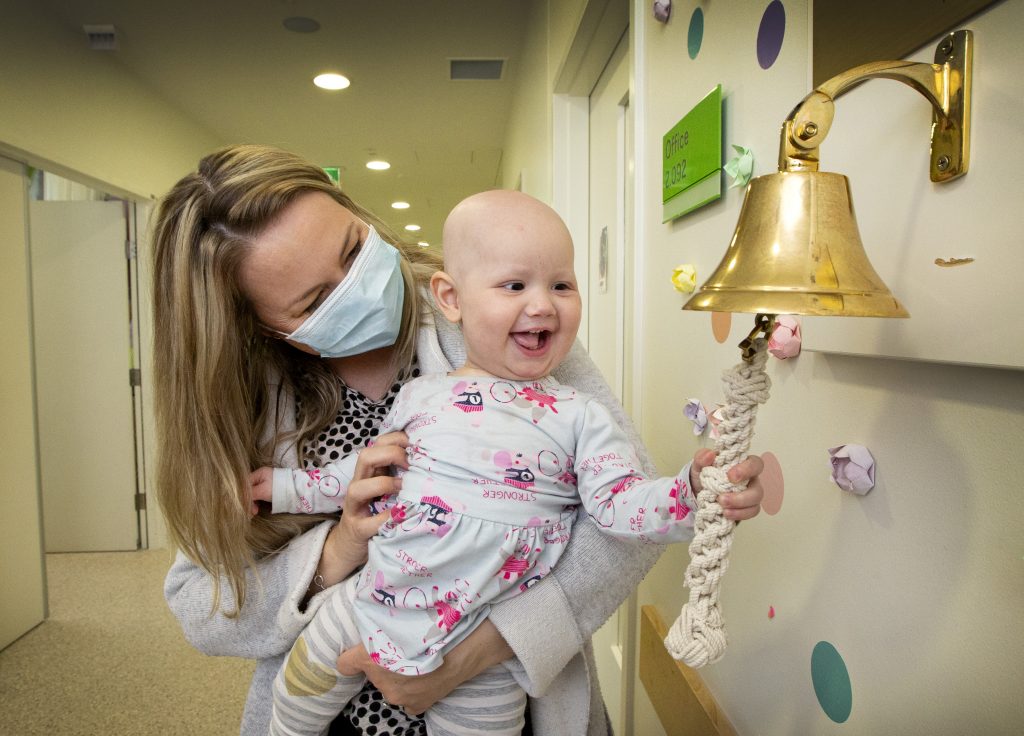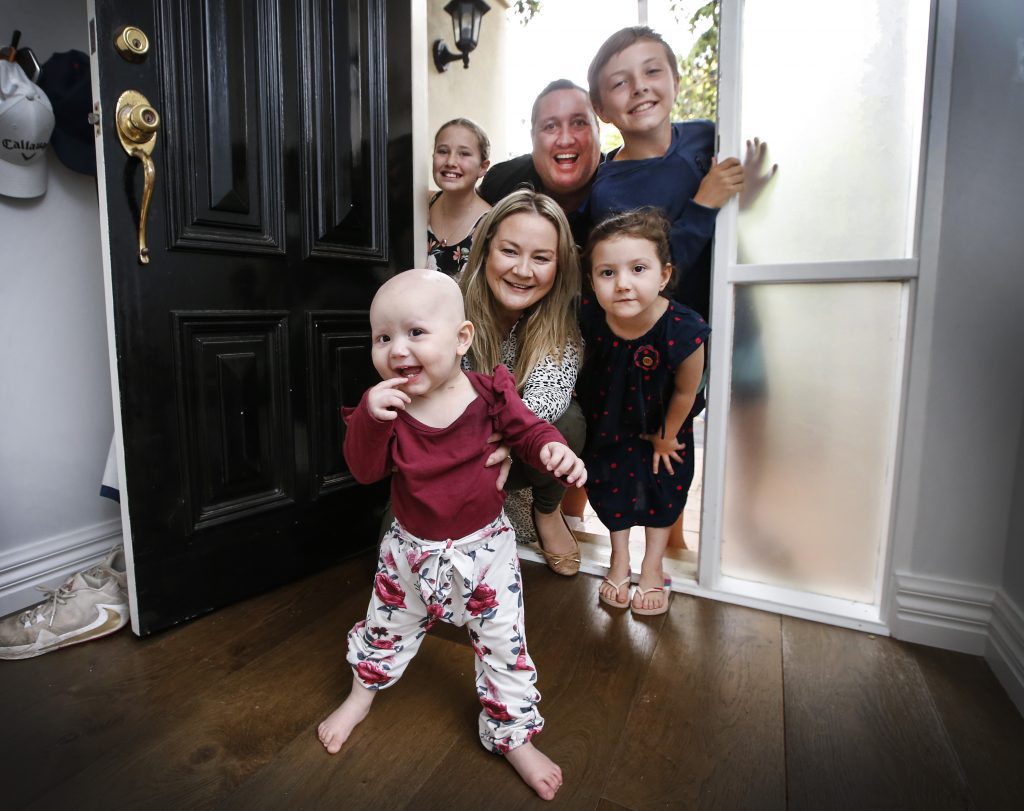Originally published in the Herald Sun, 2 April 2021
Words: Brigid O’Connell
Photo: David Caird
Baby River Reid was dying.
In just three weeks, a rare blood cancer had taken such a strong hold on the six-month-old that the brain and spinal cord were the only parts of her body without tumours.
To make her predicament worse, River’s immune system had gone into such overdrive as it tried to fight off the cancer it became an additional illness that started shutting down organ after organ. The right diagnosis and treatment came with no time to spare.
Now, after 147 nights at The Royal Children’s Hospital and a “perfect” response to treatment, the one-year-old is home and free to start living life untethered to tubes, drains, monitors and machines.
“The doctors keep looking at her and saying she’s remarkable, she’s an inspiration,” mum Julia Reid said.
“Until just this month, I haven’t let myself think about the future. But she’s passed the first three months still in remission.
“At the end of the street is the school she will go to. We walk past it and I can now let myself think; she will go to this school.”
It started as a low-grade fever in Julia and Simon’s youngest child. But after a week it had jumped to 41 degrees. A COVID test ruled that out, and via a telehealth GP consultation they were advised it was time to go to ED.
River went downhill quickly, going from a child happy to sit up and play to one with a heart rate of 220 beats a minute who was no longer crying and within a few days needed help to breathe.
Scans found masses throughout her body.
“It’s literally like an atomic bomb goes off in your life,” Julia said.
“I remember when she went to get her first CAT scan when they found the mass, I was bawling.
“I knew they were about to completely smash my heart. It’s like there is a tank coming towards you, you’re going to get shot and you can’t stop it. It’s really traumatic.”
As her need for more intensive care support grew, River was transferred to the Royal Children’s Hospital.
“She was declining and they saw it and they did something about it. We’re so grateful,” Julia said.

River Reid has spent most of her short life in the RCH being treated for cancer, finally gets to ring the cancer bell helped up by mum Julia Reid on completing her treatment. Picture: David Caird
“When she was about to go under the anaesthetic to put her on the ventilator, I said goodbye. They didn’t even know if she would survive even putting her on life support.”
“Her kidneys were shutting down because they were full of cancer, her liver was shutting down.
“The oncologist said she was fighting the intubation. It shows she has sass, and she’s going to need it.”
It was a Friday night and emergency testing protocols were enacted, which saw specialists mobilised and the pathology team work around the clock to get her diagnosed by Monday morning.
“They said all the things we’re testing for are bad,” Julia said.
“I had my first panic attack. However bad and horrible and scary you think it is, it’s worse. However terrifying you image that situation, it’s worse.”
Paediatric oncologist Diane Hanna said this rapid testing was life saving for River.
“A critical part of this case is that it was really was a matter of life and death,” Dr Hanna said.
“Each day she was becoming quite unwell. When she came across to us it would have been a matter of 24 hours (left of life) if we hadn’t mobilised the troops to get a diagnosis. I don’t think she could have waited until the Monday.”
Tests found that River had stage four anaplastic large cell lymphoma. It had caused hundreds of nodes to grow through her body and in her organs.
This cancer had sent her immune system into overdrive, a rare condition called HLH or hemophagocytic lymphohistiocytosis, which also triggers immune cells to destroy many of the organs.
“We know if we treat the lymphoma, the abnormal immune response goes away,” Dr Hanna said.
It was one of the most intense prescriptions of chemotherapy that can be given. River endured 60 doses of high-dose chemotherapy back-to-back for 20 weeks. She needed to stay in hospital — largely room-bound — throughout the treatment.
While the doctors and nurses did their bit, Julia embraced the important role she needed to play.
Despite aching for her three other children at home — Grace, 4, Charlotte, 10, and Blake, 12 — each morning upon waking she would call out to Alexa, “Play some fun music” to start the day with dance and song.
There were rubber ducks for River’s bath. Her hospital room was decorated with her favourite toys.
“Someone told her being positive was going to be a big part of her recovery. This is five months of her life, half her life. I didn’t want to wish that away,” Julia said.
“You’re isolated, you can’t leave the ward, and for six weeks she couldn’t leave her room.
“I made a decision that we were going to be positive, we were going to make it fun, and she was still going to have a happy childhood.”
“It was a choice every single day.”
River’s response to the treatment was “perfect”, Dr Hanna said, “exactly what we wanted”.
“Children who respond very quickly and are in remission at the earliest time point means that their risk of relapse is low,” she said.
“The critical period is always in those first couple of years after finishing treatment. We’ll be watching her very closely.”
Home and relishing the chance to play on grass for the first time, explore the world without being connected to an IV pole, and be doted on by her older siblings, River is loving her second chance at life.
“After going through this, there are two things we’ve realised are really important: health and connection. For the rest of our lives that’s all we want. Relationships, love, happiness and connection — that’s all we want for our kids,” Julia said.
Update September 2021: River is still in remission, and continues to thrive.

River Reid, who has spent most of her short life in the RCH being treated for Anaplastic large cell lymphoma cancer, arrives through the front door of her home she barely lived in with parents Julia and Simon Reid and Charlotte 10, Blake 12 and Grace 4. Picture: David Caird
